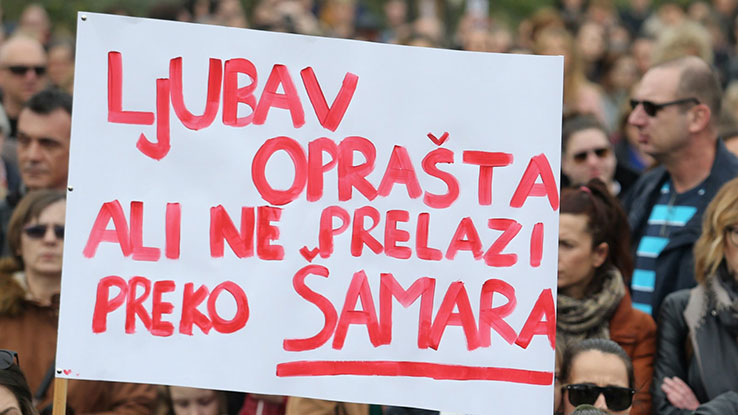Bojana Guberac
 The case of Mara Tomasevic, which was all over the media in recent years, clearly depicts how the Croatian judiciary, despite recent triumphs of civil society, continues to protect perpetrators - especially those in positions of power. However, the problem with violence against women in Croatia is much deeper and rests on patriarchal patterns that are certainly difficult to break.
The case of Mara Tomasevic, which was all over the media in recent years, clearly depicts how the Croatian judiciary, despite recent triumphs of civil society, continues to protect perpetrators - especially those in positions of power. However, the problem with violence against women in Croatia is much deeper and rests on patriarchal patterns that are certainly difficult to break.
That’s marriage
"That’s marriage (Tako vam je to u braku)" is one of the most disgraceful sentences uttered before the public in recent Croatian history. Made much more shameful by the fact that a woman in a position of power said it in 2018, answering a journalist's question whether it is not strange that the wife of Pozega-Slavonia County Prefect Alojz Tomasevic withdrew her lawsuit against the abusive husband and politician after the story of long-term domestic violence got out in the public. The person who uttered that callous and shameful sentence is the now replaced Minister of Demography, Family, Youth and Social Policy Nada Murganic, who then added that it was not up to her to assess "whether it is strange, but they should have resolved it earlier, within the family".
The depth to which Croatia is rooted in patriarchy, which both figuratively and literally tramples on women, can be seen in the example of the former minister. To hear the Minister of Family say that violence should stay within the family sounds completely surreal, Alan-Fordian. However, her words are no laughing matter. The character of Nada Murganic is indicative of something much bigger than just herself; it shows the appallingly high number of women in Croatia who are so indoctrinated with patriarchal patterns that they are no longer able to even recognize them. Assuming, of course, that Murganic was not aware of the severity and responsibility of what she said.
Secondary victimization
Victim shaming is one of the key factors why women do not report and/or talk about violence. It seems a bit quixotic to constantly point out that the victim has nothing to be ashamed of. Shame should always be felt by the abuser. Shame, speaking from a common-sense point of view, should also be felt by society overall. This, however, is hardly the case. It often happens that women in Croatia experience secondary victimization, often by the closest circle of families.
The case is the same with Mara Tomasevic, who once stated that her daughter and some of her relatives dissuaded her from reporting the Pozega-Slavonia County Prefect for years.
Shameful verdict and even more shameful epilogue
Fortunately, withdrawing the lawsuit did not have much of an effect, considering that these were criminal offenses that are prosecuted ex officio, so the proceedings continued. The legal finalization of this story took place in December 2020, once again proving that the Croatian judiciary, although not declaratively, protects abusers. Penalties for domestic violence and violence in general are mostly disgraceful or non-existent, so it seems almost impossible that the same judge read the explanatory note of the verdict and imposed the sentence.
Tomasevic was sentenced to ten months of probation for years of physical and psychological abuse of his wife Mara. And the court, it should be added, took four years to reach a verdict.
In those four infernal years, Tomasevic did not resign from the position of prefect, although the Prime Minister Andrej Plenkovic publicly insisted on it. Although both the opposition and civil society demanded the removal of Tomasevic from the post of prefect, the rotten and insufficient legal regulations in this field had the final say. In other words, the system and laws protected Tomasevic.
The law stipulates that the mandate of the prefect ends in case he resigns, if he is deprived of legal capacity by a final court decision, if he is sentenced to an unconditional prison sentence of more than one month, if he moves out of the county, if he ceases to be a Croatian citizen and in case of death. Given that the prefect expressed defiance to the prime minister and made it public that he does not intend to resign, legally speaking, the recall of the prefect could only be achieved through a referendum, but this has not happened for years.
According to the law, the decision to recall a prefect can be made if the majority of voters voted “For” in the referendum, provided that the majority is at least one third of the total number of voters registered in the electoral roll. It should be pointed out that the turnout at elections in Croatia is extremely low, with less than half of the citizens voting in the last parliamentary elections (46.85 percent). Hence, it would be almost impossible in practice for a third of voters to go to the referendum and vote for the recall.
 Source: zadovoljna.dnevnik.hr
Source: zadovoljna.dnevnik.hr
Failure of the institutions
Even without a referendum, things could have been made complicated for the prefect by not supporting the Budget Proposal at least for 2021, but this was not done either. In this context, before the budget was put up to voting, the local 034 portal asked the president of the HDZ County Committee of Pozega-Slavonia County, Zeljko Glavic, whether the HDZ Representatives' Club would be in favor of the proposed budget.
The bottom line of Glavic’s answer was that they do not support Tomasevic, but they will support him, at least as far as the budget is concerned. It sounds completely insane and contradictory, and the only thing crazier than that may be the fact that the president of the HDZ Club of the Pozega-Slavonia County Assembly is Marijan Aladrovic, former Pozega-Slavonia County Prefect and father of Josip Aladrovic, Minister of Labor and Pension System, whose ministerial competencies extend to family and social policy since July 2020. So, the father of the minister responsible for family matters, also making him responsible for the fight against domestic violence, once again enabled Tomasevic's majority in the Assembly. Turns out, you can have your cake and eat it, too.
The #spasime (#saveme) initiative has led to stricter penalties for violence
Commenting on the case, Minister of Justice Ivan Malenica announced that they would include the criminal offense of domestic violence as an obstacle to running in local elections in the amendment to the Law on Local Elections. The question is whether such an announcement would have happened had not there been strong pressure from civil society, which in the last two years brought a ray of light to the dark side of Croatian judiciary. A single ray, indeed, because the statistics are relentless, indicating that every third woman in Croatia is a victim of domestic violence.
To get the complete picture of the effects of civil society, it is necessary to go back to 2019, at a time when the Minister of Demography, Family, Youth and Social Policy Nada Murganic was mentioned. At that time, an unprecedented case of domestic violence took place on the island of Pag, which shocked the Croatian public. A father threw his four minor children off the balcony of their family home. This horrific act revealed all the background problems of the social protection system in relation to an issue that seems untouched for years.
It was this crime that prompted actress, screenwriter and author Jelena Veljaca to set up the #SPASIME (#SAVEME) civic initiative, the activities of which are aimed at sensitizing the public and relevant institutions about the problem of domestic violence and inadequate protection of victims. More than 30,000 people joined the movement on Facebook in less than five days.
This time, however, the fight did not merely remain on Facebook. The initiators of the movement took concrete steps, protests took place in major Croatian cities, and the agreement with Prime Minister Andrej Plenkovic, then Minister of Justice Drazen Bosnjakovic and Minister of Demography Vesna Bedekovic was crucial, after which the necessary legal amendments were made.
Until then, the law foresaw the infamous non-consensual sexual intercourse act, a controversial criminal offense that was distinct from rape in the then Criminal Code. As of 2020, we are finally calling things by their real names, at least as far as rape is concerned. Non-consensual sexual intercourse has been abolished. In addition, the sentence for rape has been increased from a minimum of one to a minimum of three years in prison. The maximum sentence still remains ten years. The use of any physical force against a family member causing an injury - a bruise or any serious injury - is now a criminal offense, punishable by one to three years in prison and is no longer treated as a misdemeanor in the eyes of the law. Pushing or pulling hair after which no bodily injury occurred will continue to be sanctioned as a misdemeanor punishable by a fine of HRK 2,000 (EUR 265), up to 90 days in prison, but if such an offense is repeated in the family, the perpetrator will be prosecuted under the Criminal Code for the offense of domestic violence, which also carries a sentence of one to three years in prison.
In late 2020, as a guest on a podcast on the Lupiga portal, Veljaca announced that the current Minister of Justice, Ivan Malenica, said that Andrej Plenkovic's government plans to establish a family court, which would certainly make it easier for victims of violence to fight for justice. However, when it comes to Croatian judiciary, we can hardly be optimistic and believe that the establishment of a family court will bring radical changes.
Proof of this is precisely the case of Mara Tomasevic, shining a light on the ramshackle foundations on which the Croatian state is built. It proved that crimes go unpunished even when you have the support of the media and civil society, and most importantly - the law on your side.
For a complete image of the Croatian state's attitude towards violence against women, without going beyond the case of Mara Tomasevic, it is enough to recall the bizarre moment when Alojz Tomasevic, already having been accused of domestic violence, with the public already well acquainted with the case, was a guest in the show "Lijepom našom", one of the longest-running and most popular shows on Croatian Radio and Television. The reported abuser sang and rejoiced on television, a TV broadcaster paid by the citizens of Croatia, and the people applauded him. And that is the sad, but true picture of our beautiful country.
It is time to introduce Civic Education in all schools
In order for things to truly change for the better in Croatia, and in almost all the countries of former Yugoslavia - the situation in Serbia, for example, is much worse - it is necessary to change the people’s paradigm that is based on patriarchal patterns. A critical step is the introduction of Civic Education as a compulsory subject in all schools. Young people need to develop critical thinking based on the principles of democracy, in which women are not "inferior". This will certainly slowly change their attitude towards violence. For, every time we don't react to violence, when we don't condemn it because it doesn't happen to us and when we don't teach children from an early age how unacceptable violence is - we tacitly support violence and create a society of violence.
Please refer to the Terms before commenting and republishing the content.
Note: The views and opinions expressed in this article are those of the author and do not necessarily reflect the views of the Institute of Communication Studies or the donor.


